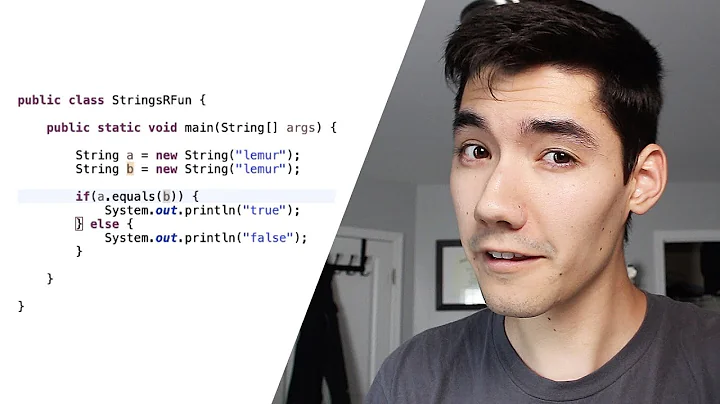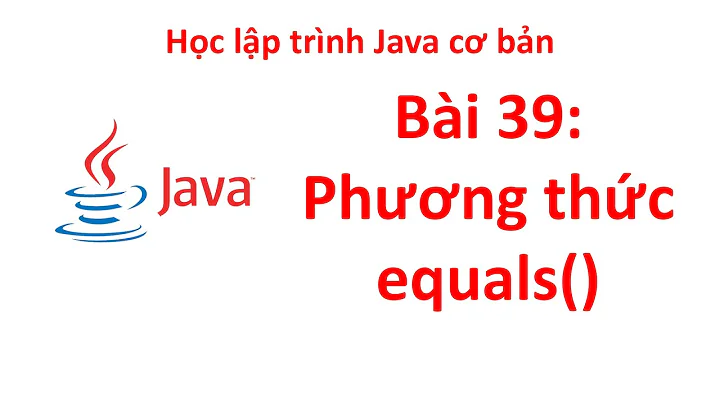Java: Integer equals vs. ==
Solution 1
The JVM is caching Integer values. Hence the comparison with == only works for numbers between -128 and 127.
Refer: #Immutable_Objects_.2F_Wrapper_Class_Caching
Solution 2
You can't compare two Integer with a simple == they're objects so most of the time references won't be the same.
There is a trick, with Integer between -128 and 127, references will be the same as autoboxing uses Integer.valueOf() which caches small integers.
If the value p being boxed is true, false, a byte, a char in the range \u0000 to \u007f, or an int or short number between -128 and 127, then let r1 and r2 be the results of any two boxing conversions of p. It is always the case that r1 == r2.
Resources :
On the same topic :
Solution 3
"==" always compare the memory location or object references of the values. equals method always compare the values. But equals also indirectly uses the "==" operator to compare the values.
Integer uses Integer cache to store the values from -128 to +127. If == operator is used to check for any values between -128 to 127 then it returns true. for other than these values it returns false .
Refer the link for some additional info
Solution 4
Integer refers to the reference, that is, when comparing references you're comparing if they point to the same object, not value. Hence, the issue you're seeing. The reason it works so well with plain int types is that it unboxes the value contained by the Integer.
May I add that if you're doing what you're doing, why have the if statement to begin with?
mismatch = ( cdiCt != null && cdsCt != null && !cdiCt.equals( cdsCt ) );
Solution 5
The issue is that your two Integer objects are just that, objects. They do not match because you are comparing your two object references, not the values within. Obviously .equals is overridden to provide a value comparison as opposed to an object reference comparison.
Related videos on Youtube
Jeremy Goodell
Senior Software Developer at Pearson. Work from home in beautiful Eugene, Oregon. I have over 30 years software experience with 15+ years web development.
Updated on September 24, 2020Comments
-
Jeremy Goodell over 3 years
As of Java 1.5, you can pretty much interchange
Integerwithintin many situations.However, I found a potential defect in my code that surprised me a bit.
The following code:
Integer cdiCt = ...; Integer cdsCt = ...; ... if (cdiCt != null && cdsCt != null && cdiCt != cdsCt) mismatch = true;appeared to be incorrectly setting mismatch when the values were equal, although I can't determine under what circumstances. I set a breakpoint in Eclipse and saw that the
Integervalues were both 137, and I inspected the boolean expression and it said it was false, but when I stepped over it, it was setting mismatch to true.Changing the conditional to:
if (cdiCt != null && cdsCt != null && !cdiCt.equals(cdsCt))fixed the problem.
Can anyone shed some light on why this happened? So far, I have only seen the behavior on my localhost on my own PC. In this particular case, the code successfully made it past about 20 comparisons, but failed on 2. The problem was consistently reproducible.
If it is a prevalent problem, it should be causing errors on our other environments (dev and test), but so far, no one has reported the problem after hundreds of tests executing this code snippet.
Is it still not legitimate to use
==to compare twoIntegervalues?In addition to all the fine answers below, the following stackoverflow link has quite a bit of additional information. It actually would have answered my original question, but because I didn't mention autoboxing in my question, it didn't show up in the selected suggestions:
Why can't the compiler/JVM just make autoboxing “just work”?
-
Jeremy Goodell over 13 yearsThanks, that certainly explains why 137 fails! And it also answers my question about why it's not a prevalent problem, in 95% of the cases I'm going to encounter, the value would be under 127. Good to catch this now though for the 5% where it isn't.
-
Jeremy Goodell over 13 yearsInteresting side note: up until a couple weeks ago, cdiCt and cdsCt were both ints so this was fine, but I had to make them Integers in order to check for the null situation which is handled differently ...
-
Jeremy Goodell over 13 yearsGood answer, but it doesn't explain why it's only failing for 137.
-
Adam over 13 years@Jeremy Yeah, it's a pretty obscure problem, but as a general rule you use .equals() for Objects and == for primitives. You can't rely on autounboxing for equality testing.
-
Jeremy Goodell over 13 yearsLol, check mark back to you then! Looks like Colin has more than enough points already anyway.
-
 matbrgz over 11 yearsIs the guarantee from the JLS or just for the Oracle JVM?
matbrgz over 11 yearsIs the guarantee from the JLS or just for the Oracle JVM? -
Colin Hebert over 11 yearsThe quoted part is from the JLS, so it's a guarantee from the JLS
-
hansvb about 9 yearsRe: guarantee. I still wouldn't rely on it too much.
new Integer(1) == new Integer(1)is still false. -
 MC Emperor over 7 years@Thilo
MC Emperor over 7 years@Thilonew ... == new ...is alwaysfalse. -
hansvb over 7 years@MCEmperor: exactly. So just get into the habit of never using
==. If you get the two integers as parameters from somewhere, you have no way to know if they were created from that cache or not. -
 MC Emperor over 7 years@Thilo True, always use
MC Emperor over 7 years@Thilo True, always useequals()when dealing with objects. This should be one of the first things one should know when learning Java. By the way, I would have guessed that the constructor ofIntegerwas private, i.e. that instances were always created through thevalueOf()method. But I see that the constructor is public. -
hansvb over 7 years@MCEmperor: The constructor not being private must have been an oversight back in the day.
valueOfand the caching was added later. -
kiedysktos almost 7 yearson my machine
System.out.println(128L == 128);prints outtrue. Could you give an example that doesn't work? -
Adam almost 7 yearsTry
System.out.println(new Integer(128) == new Integer(128)); -
Bill K almost 7 yearsNote that new Integer(1) != new Integer(1) as well. new ALWAYS returns a new address. Autoboxing uses a cached version. Other ways that return Integers (without newing them) probably return the cached value as well.
-
 Terran over 3 yearsThat's because
Terran over 3 yearsThat's because==more or less compares values on the stack. So for primitives it's their values and for objects it's their references (hashcode)..equalscompares whatever was defined in the overriden method of the corresponding class. Note that if there's no override, the default.equalsinObjectdoes the following:return (this == obj);. -
 kaya3 about 3 yearsOne reason to keep the constructor
kaya3 about 3 yearsOne reason to keep the constructorpublicbesides backwards compatibility is that it's slightly faster to create anIntegerobject without checking the cache, if you know it's probably not going to be in the cache. At some point the cost of doing a cache check for every value outweighs the extra cost of garbage-collecting the few extra objects that would have been in the cache.








